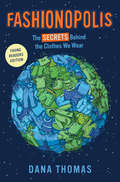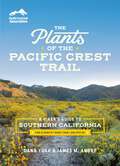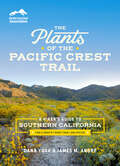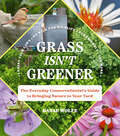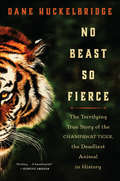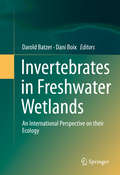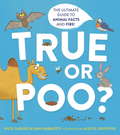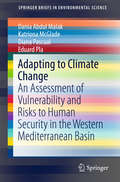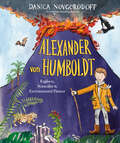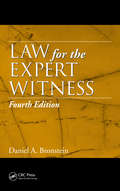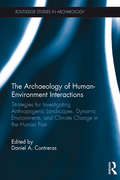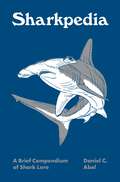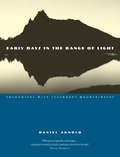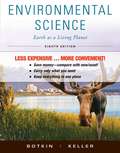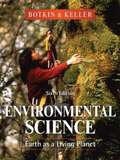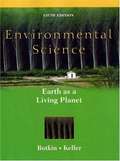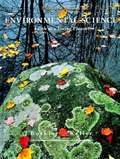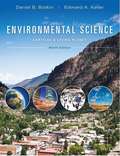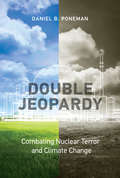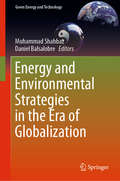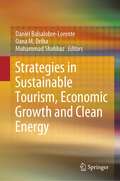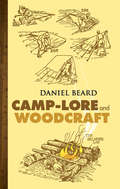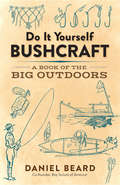- Table View
- List View
Fashionopolis (Young Readers Edition): The Secrets Behind the Clothes We Wear
by Dana ThomasA look at fast fashion and its impact on the environment and social justice, perfect for middle grade classroomsDid you ever think about where your jeans come from? How about the people who made your T-shirt, or what happens to the clothes you grow out of when you're done wearing them? The fabrics clothes are made of, the way they are designed and sewn and shipped around the world, and the way we consume them and get rid of them--every step in this process has a big impact on our environment, on the people who work in clothing factories, and on our cultures. This nonfiction book shows us how the clothes we wear--and throw away--every day are made, and what that means for our planet and for people around the world.
The Plants of the Pacific Crest Trail: A Hiker's Guide to Northern California
by Dana York James M. AndréDiscover and appreciate the flowers, trees, and other plants on the Pacific Crest Trail with this beautiful guide to the American West's natural wonders. Quickly find, identify, and learn about the amazing range of plants growing along the Northern California stretch of the Pacific Crest Trail. It&’s easy with The Plants of the Pacific Crest Trail, organized by type, color, and trail section. You may encounter carnivorous sundews or lilies with petals like butterfly wings. With hundreds of color photos and lively, accessible descriptions, there&’s so much you can learn. Whether you&’re enjoying a day hike, exploring with your family, or setting out on the trek of a lifetime, you&’ll forge a deeper connection with nature through the beautiful plants on display mile after mile.
The Plants of the Pacific Crest Trail: A Hiker's Guide to Southern California
by Dana York James M. AndréDiscover and appreciate the flowers, trees, and other plants on the Pacific Crest Trail with this beautiful guide to the American West's natural wonders. Quickly find, identify, and learn about the amazing range of plants growing along the Southern California stretch of the Pacific Crest Trail. It&’s easy with The Plants of the Pacific Crest Trail, the first book of its kind, organized by type, color, and trail section. Over 1200 color photos and lively, accessible descriptions make your outing memorable. Did you know that you can see the world&’s biggest pinecone along the PCT? Or discover a plant that smells like cheese? Whether you&’re enjoying a day hike, exploring with your family, or setting out on the trek of a lifetime, you&’ll forge a deeper connection with nature through the beautiful plants on display mile after mile.
Houseplants for All: How to Fill Any Home with Happy Plants
by Danae HorstTurn over a new leaf with Houseplants for All, and actually keep all your plant babies happy and healthy. Use the plant profile quiz to easily find your perfect match instead of picking up whatever catches your eye at the store and hoping that it'll survive your home and lifestyle. Whether you're always busy and can't remember to water, get unobstructed natural light all day, or live in the shadow of a skyscraper, a tropical oasis or arid winter-land, there is a plant that'll thrive with you.After finding the right plants for your home, this book will help you to master plant care, complete with projects and tips for which containers work best, the best plants for small places, how to live together with pets and plants, and solutions to problems like pests, root rot, and lack of nutrients. Whether you're an experienced plant parent or have never owned anything other than a fake ficus, this book is the perfect guide for happy plants in your home.
Grass Isn't Greener: The Everyday Conservationist's Guide to Bringing Nature to Your Yard
by Danae WolfeBuilt around easy-to-digest tips for improving sustainability, this fun, action-oriented guide will help everyone turn their home garden into an earth-friendly habitat. Rooted in twenty practical steps that anyone can take starting today, Grass Isn&’t Greener demonstrates how small changes in your yard or garden can create lasting impact for the planet: from leaving your leaves to selecting eco-friendly holiday decorations; from eliminating light pollution to attracting wildlife; from saving seeds to devoting even a small patch of lawn to native plants. With easy-to-follow advice and real-life examples, conservation educator Danae Wolfe will help you appreciate the new life you&’ve attracted to your yard. A companion for new homeowners, renters, and gardeners, Grass Isn't Greener is a resource for anyone looking for little ways to make a big difference—and to have fun doing it.
No Beast So Fierce: The Terrifying True Story of the Champawat Tiger, the Deadliest Man-Eater in History
by Dane HuckelbridgeA gripping, multifaceted true account of the deadliest animal of all time and the hunter on its trail, equally comparable to Jaws as to Matthiessen's The Snow Leopard. "A SUBURB WORK OF NATURAL HISTORY." —Booklist, starred review • "A GRIPPING PAGE-TURNER." —PW • "A REMARKABLE NARRATIVE." —Michael Wallis Nepal, c. 1900: The single deadliest animal in recorded history began stalking humans, moving like a phantom through the lush foothills of the Himalayas.As the death toll reached an astonishing 436 lives, a young local hunter was dispatched to stop the now-legendary man-eater before it struck again. One part pulse-pounding thriller, one part soulful natural history of the endangered Royal Bengal tiger, acclaimed writer Dane Huckelbridge’s No Beast So Fierce is the gripping, true account of the Champawat Tiger, which terrified northern India and Nepal from 1900 to 1907, and Jim Corbett, the legendary hunter who pursued it. Huckelbridge’s masterful telling also reveals that the tiger, Corbett, and the forces that brought them together are far more complex and fascinating than a simple man-versus-beast tale. At the turn of the twentieth century as British rule of India tightened and bounties were placed on tiger’s heads, a tigress was shot in the mouth by a poacher. Injured but alive, it turned from its usual hunting habits to easier prey—humans. For the next seven years, this man-made killer terrified locals, growing bolder with every kill. Colonial authorities, desperate for help, finally called upon Jim Corbett, a then-unknown railroad employee of humble origins who had grown up hunting game through the hills of Kumaon. Like a detective on the trail of a serial killer, Corbett tracked the tiger’s movements in the dense, hilly woodlands—meanwhile the animal shadowed Corbett in return. Then, after a heartbreaking new kill of a young woman whom he was unable to protect, Corbett followed the gruesome blood trail deep into the forest where hunter and tiger would meet at last.Drawing upon on-the-ground research in the Indian Himalayan region where he retraced Corbett’s footsteps, Huckelbridge brings to life one of the great adventure stories of the twentieth century. And yet Huckelbridge brings a deeper, more complex story into focus, placing the episode into its full context for the first time: that of colonialism’s disturbing impact on the ancient balance between man and tiger; and that of Corbett’s own evolution from a celebrated hunter to a principled conservationist who in time would earn fame for his devotion to saving the Bengal tiger and its habitat. Today the Corbett Tiger Reserve preserves 1,200 km of wilderness; within its borders is Jim Corbett National Park, India’s oldest and most prestigious national park and a vital haven for the very animals Corbett once hunted.An unforgettable tale, magnificently told, No Beast So Fierce is an epic of beauty, terror, survival, and redemption for the ages.
Invertebrates in Freshwater Wetlands
by Darold Batzer Dani BoixWetlands are among the world's most valuable and most threatened habitats, and in these crucially important ecosystems, the invertebrate fauna holds a focal position. Most of the biological diversity in wetlands is found within resident invertebrate assemblages, and those invertebrates are the primary trophic link between lower plants and higher vertebrates (e. g. amphibians, fish, and birds). As such, most scientists, managers, consultants, and students who work in the world's wetlands should become better informed about the invertebrate components in their habitats of interest. Our book serves to fill this need by assembling the world's most prominent ecologists working on freshwater wetland invertebrates, and having them provide authoritative perspectives on each the world's most important freshwater wetland types. The initial chapter of the book provides a primer on freshwater wetland invertebrates, including how they are uniquely adapted for life in wetland environments and how they contribute to important ecological functions in wetland ecosystems. The next 15 chapters deal with invertebrates in the major wetlands across the globe (rock pools, alpine ponds, temperate temporary ponds, Mediterranean temporary ponds, turloughs, peatlands, permanent marshes, Great Lakes marshes, Everglades, springs, beaver ponds, temperate floodplains, neotropical floodplains, created wetlands, waterfowl marshes), each chapter written by groups of prominent scientists intimately knowledgeable about the individualwetland types. Each chapter reviews the relevant literature, provides asynthesis of the most important ecological controls on the residentinvertebrate fauna, and highlights important conservation concerns. The finalchapter synthesizes the 15 habitat-based chapters, providing a macroscopicperspective on natural variation of invertebrate assemblage structure acrossthe world's wetlands and a paradigm for understanding how global variation andenvironmental factors shape wetland invertebrate communities.
True or Poo?: The Ultimate Guide to Animal Facts and Fibs (Does It Fart Ser. #2)
by Nick Caruso Dani RabaiottiThe toilet-tastic book that asks young readers to guess if animal facts are true...or POO?!Do wombats have cube-shaped poo?Do you eat spiders in your sleep?Do beetles pretend to be ant bottoms?In this hilariously helpful guide to which facts about the animal kingdom are true or false, you might be surprised to learn what's true ... and what's a big pile of poo! And you will find out a lot about that smelly stuff in this book too, from how it's made to which animals eat their own waste. (Yuck!)But will you be able to guess what's real and what's made up? Find out in this comical collection of weird habits, cool facts and sneaky myths about your favourite animals!This HILARIOUS book is the companion title to Does it Fart?
Adapting to Climate Change: An Assessment of Vulnerability and Risks to Human Security in the Western Mediterranean Basin (SpringerBriefs in Environmental Science)
by Katriona Mcglade Dania Abdul Malak Diana Pascual Eduard PlaThis book examines the water-related impacts of climate change in the UNESCO Intercontinental Biosphere Reserve of the Mediterranean (IBRM) straddling Spain and Morocco. This is the first in-depth publication on a fascinating transboundary case study; while climate change effects are rather homogenous across the IBRM, differing socio-economic contexts, land-use patterns and policy frameworks in Spain and Morocco mean considerable variations in vulnerability and consequences for human security. The authors have produced a novel and integrated vulnerability assessment that combines hydro-ecological, socio-economic and policy analyses. The interdisciplinary approach and insights contained in this volume will appeal both to those interested in the integration of natural and social sciences as well as those working on water and climate change from academic, practical or policy-oriented perspectives.
Alexander von Humboldt: Explorer, Naturalist & Environmental Pioneer
by Danica NovgorodoffBudding botanists, growing geologists, and early explorers will dive into this picture book biography about the father of ecology, Alexander von Humboldt. The captivating prose and art from a New York Times bestselling illustrator will spark a passion for discovery and conservation in the youngest readers.Whether sailing across the ocean, hiking through the jungle, or climbing the highest volcanic peaks, everywhere Alexander went, he observed the land, animals, and culture. And where others saw differences, Alexander spotted connections. Discover the incredible life of naturalist Alexander von Humboldt, whose explorations created the basis for modern ecology, whose travels made him one of the most famous scientists of his day, and whose curiosities have inspired generations of creative thinkers.
Law for the Expert Witness
by Daniel A. BronsteinExtensively updated and expanded to incorporate legislative and practical changes enacted since the publication of the previous edition, Law for the Expert Witness, Fourth Edition is designed for professionals and students requiring edification on the current processes and techniques of legal procedure.Drawn from revised versions of the readings as
The Archaeology of Human-Environment Interactions: Strategies for Investigating Anthropogenic Landscapes, Dynamic Environments, and Climate Change in the Human Past (Routledge Studies in Archaeology)
by Daniel A. ContrerasThe impacts of climate change on human societies, and the roles those societies themselves play in altering their environments, appear in headlines more and more as concern over modern global climate change intensifies. Increasingly, archaeologists and paleoenvironmental scientists are looking to evidence from the human past to shed light on the processes which link environmental and cultural change. Establishing clear contemporaneity and correlation, and then moving beyond correlation to causation, remains as much a theoretical task as a methodological one.This book addresses this challenge by exploring new approaches to human-environment dynamics and confronting the key task of constructing arguments that can link the two in concrete and detailed ways. The contributors include researchers working in a wide variety of regions and time periods, including Mesoamerica, Mongolia, East Africa, the Amazon Basin, and the Island Pacific, among others. Using methodological vignettes from their own research, the contributors explore diverse approaches to human-environment dynamics, illustrating the manifold nature of the subject and suggesting a wide variety of strategies for approaching it. This book will be of interest to researchers and scholars in Archaeology, Paleoenvironmental Science, Ecology, and Geology.
Sharkpedia: A Brief Compendium of Shark Lore (Pedia Bks. #13)
by Daniel AbelA fun, pocket-size A–Z treasury about sharks, featuring fascinating, little-known facts and captivating illustrationsSharkpedia is an entertaining and enlightening celebration of sharks featuring close to 100 entries, based on the latest knowledge and enriched by original illustrations. Avoiding tired factoids, shark authority Daniel Abel gives new bite to essential information about sharks, including their adaptations as top predators, 450-million-year evolution, behavioral complexity, ecological importance, existential threats, and often sensationalized appearances in popular culture, from Jaws to Shark Week.The notion that sharks are insatiable killing machines is a toothless myth—yet the fear of shark attacks still holds on to many people like a set of locked jaws. Sharkpedia reveals that sharks are much less to be feared—and much more interesting, complicated, and important—than many realize. Filled with compelling stories, Sharkpedia debunks shark myths (for example, that sharks are large and coastal when in fact most are small and inhabit the deep sea), describes their lives (where and how long they live, how many offspring they have, what they eat, and how their bodies function), introduces a variety of iconic and obscure species (such as the Happy Eddie Shyshark), explores our love/hate relationship with sharks, and much more.With charming drawings by leading shark artist Marc Dando, Sharkpedia is a scientific and cultural treasure trove that will leave you with new insights about these remarkable animals. Dive in!Features a cloth cover with an elaborate foil-stamped design
Early Days in the Range of Light: Encounters with Legendary Mountaineers
by Daniel ArnoldIt's 1873. Gore-Tex shells and aluminum climbing gear are a century away, but the high mountains still demand your attention. Imagine the stone in your hands and thousands of feet of open air below you, with only a wool jacket to weather a storm and no rope to catch a fall. Daniel Arnold did more than imagine - he spent three years retracing the steps of his climbing forefathers, and in Early Days in the Range of Light, he tells their riveting stories. From 1864 to 1931, the Sierra Nevada witnessed some of the most audacious climbing of all time. In the spirit of his predecessors, Arnold carried only rudimentary equipment - no ropes, no harness, no specialized climbing shoes. Sometimes he left his backpack and sleeping bag behind as well, and, like John Muir, traveled for days with only a few pounds of food rolled into a sack slung over his shoulder.In an artful blend of history, biography, nature, and adventure writing, Arnold brings to life the journeys and the terrain traveled. In the process he uncovers the motivations that drove an extraordinary group of individuals to risk so much for airy summits and close contact with bare stone and snow.
Environmental Science: Earth As A Living Planet 8th Ed
by Daniel B. Botkin Edward A. KellerEnvironmental Science: Earth as a Living Planet, Eighth Edition provides emphasis on the scientific process throughout the book gives readers the structure to develop their critical thinking skills. Updated and revised to include the latest research in the field, the eighth edition continues to present a balanced analytical and interdisciplinary approach to the field. New streamlined text clears away the "jargon" to bring the issues and the science to the forefront.
Environmental Science: Earth As a Living Planet
by Daniel B. Botkin Edward A. KellerUpdated and revised to include the latest research in the field, the new Sixth Edition of Environmental Science continues to present a balanced analytical and interdisciplinary approach to the field. This approach equips readers with a solid scientific background in environmental science, so they can think through environmental issues and make their own decisions. Five central themes are weaved throughout the book: Human Population Growth, Sustainability, A Global Perspective, An Urban World, and Science and Values.
Environmental Science: Earth as a Living Planet
by Daniel B. Botkin Edward A. KellerAn introductory textbook that presents the most important concepts in the study of the environment from an analytical and interdisciplinary perspective, and encourages students to formulate their own thoughts about environmental problems. Annotation c. by Book News, Inc. , Portland, Or.
Environmental Science: Earth as a Living Planet
by Daniel B. Botkin Edward A KellerEnvironmental Science: Earth as a Living Planet provides an up-to-date introduction to the study of the environment. Information is presented from an analytical and interdisciplinary perspective from which we must view environmental issues in order to deal successfully with them. The goal is to teach the students how to think through environmental issues.
Environmental Science: Earth as a Living Planet (3rd edition)
by Daniel B. Botkin Edward A. KellerAn introductory textbook that presents the most important concepts in the study of the environment from an analytical and interdisciplinary perspective, and encourages students to formulate their own thoughts about environmental problems. Annotation C. by Book News, Inc., Portland, Or.
Environmental Science: Earth as a Living Planet (Ninth Edition)
by Daniel B. BotkinEnvironmental Science: Earth as a Living Planet, Ninth Edition provides emphasis on the scientific process throughout the book and gives readers the structure to develop their critical thinking skills. Updated and revised to include the latest research in the field, the 9th edition continues to present a balanced analytical and interdisciplinary approach to the field.
Double Jeopardy: Combating Nuclear Terror and Climate Change (Belfer Center Studies in International Security)
by Daniel B. PonemanMaking the case that we can use nuclear power to combat climate change even as we reduce the risks of nuclear terror.Humanity faces two existential threats: nuclear annihilation and catastrophic climate change. Both have human origins, and both are linked to the use of nuclear energy. Inherent in the use of atomic fission is the risk that the technology and materials can be diverted to terrorists or hostile nations and used to make nuclear weapons. The key question is whether we can use nuclear energy to reduce the threat of climate change without increasing the risk that nuclear weapons will be used. In Double Jeopardy, Daniel Poneman argues that the world needs an “all-of-the-above” energy policy, one that advances the goal of decarbonizing the environment through all available means—including nuclear power. Poneman makes a compelling case that we can enhance the ability of nuclear power to combat climate change even as we reduce the risks of nuclear terror. Doing so will require well-crafted laws and policies, implemented with an ethos of constant vigilance and embedded in a culture that weaves safety and security goals into the fabric of our nuclear programs. This will enable government and industry to work together to maximize energy and climate benefits while minimizing safety and security risks.
Energy and Environmental Strategies in the Era of Globalization (Green Energy and Technology)
by Muhammad Shahbaz Daniel BalsalobreThis book provides readers with cutting-edge techniques that can be applied to energy and environmental economics. Further, it highlights the effects that both globalization and economic growth have on the environment. In addition to offering a broader perspective on the relationship between environmental pollution, energy consumption and economic growth, the book studies the relationship between economic growth and environmental damage by drawing on the theoretical hypothesis of the Environmental Kuznets Curve. The book presents new econometric techniques and innovative approaches to the study of the energy economy. Accordingly, it can be used to help analyse the current state of the energy economy, the environment and globalization, and can serve as a theoretical reference manual for doctoral students and academics seeking new analytical techniques.
Strategies in Sustainable Tourism, Economic Growth and Clean Energy
by Muhammad Shahbaz Daniel Balsalobre-Lorente Oana M. DrihaThis book provides an in-depth analysis of and discussion about the relationship between green tourism, economic growth and globalization. It explores numerous topics relating to tourism including transport efficiency, foreign direct investment, clean energy, climate change dynamics and advances in sustainable tourism management. The book begins with discussion of sustainable tourism and economic growth, particularly focusing on management strategies. It then presents the relationship between energy use and tourism, looking at green energy and energy shock. It then discusses transport efficiency, tourism efficiency and financial growth in both developed and developing countries. This book is of interest to researchers, policymakers, and postgraduate students in the areas of energy, environmental and tourism economics.
Camp-Lore and Woodcraft
by Daniel BeardKnown to millions of Boy Scouts as "Uncle Dan," Daniel Beard was also a Progressive-era reformer, a naturalist, illustrator, and author. Among his many "how-to" books is this entertaining collection of camp lore and practical notes on woodcrafting.In Camp-Lore and Woodcraft, Beard, an avid outdoorsman, provides youngsters and campers of all ages with detailed, easy-to-follow advice on building campfires for light and warmth; making a good fire for cooking; and packing, saddling, and mounting a horse. There are also some fine tips on preparing for a camping trip, choosing a camp site, and pitching a tent, plus notes on how to cut down a tree and the proper way to chop wood.First published nearly a century ago, and enhanced with more than 370 of the author's own illustrations, this engagingly written book by a man with a keen appreciation of the joys of nature will delight and instruct boys and girls with its celebration of traditional Native American lore and its helpful hints on how to safely enjoy hiking, camping, and exploring the great outdoors.
Do It Yourself Bushcraft: A Book of the Big Outdoors
by Daniel BeardBoy Scouts co-founder and avid outdoorsman "Uncle Dan" Beard provides a clear, enthusiastic introduction to the joys of camping, trapping, and outdoor survival. Originally published nearly a century ago, this engagingly written and charmingly illustrated guide provides an atmospheric reminder of a simpler time. Filled with timeless wisdom on conversing with nature, the book also constitutes a source of practical tips, offering advice on fishing, canoeing, and other aspects of outdoor life. Fishing-related instruction includes information on how to catch minnows, how to make a dip net, fly fishing, bait casting, and much more. Readers can learn how to stalk, to photograph, and even to capture wild animals with their bare hands. They'll also discover how to build a canvas canoe and a dugout canoe, how to make a portage, how to handle a canoe, how to row a boat, and the names of all the parts of boats. This ageless volume will prove a helpful companion to hunters, fishermen, campers, backpackers, Scouts, and anyone who enjoys outdoor recreation and the thrill of bushcraft.
